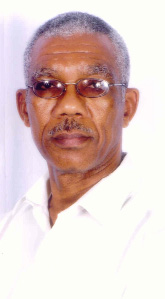APNU Leader, David Granger says the government should grant TV licences for Linden “immediately” even in the absence of a Broadcasting Authority.
“We don’t have to wait on any broadcasting authority,” he told Stabroek News yesterday. “It’s a technical matter.”
Government last year approved 11 radio licences in the absence of a Broadcasting Authority and was criticized for doing so rather than setting up the body to deal with the applications. Former television station proprietor Tony Vieira, also a former PNCR Member of Parliament has argued that the award of licences by former President Bharrat Jagdeo should be considered null and void as it violated an agreement with the late former President Desmond Hoyte for awards to be made only after a National Broadcasting Authority was established. The Guyana Media Proprietors Association called the process used to allocate the licences “unworkable” and devoid of transparency

Head of the Presidential Secretariat, Dr. Roger Luncheon had said that the president, in the absence of the Guyana National Broadcasting Authority, had the responsibility for issuing the licences.
Contacted yesterday, AFC Chairman, Khemraj Ramjattan said that the Broadcasting Authority should be set up before any new licences are granted. It should be set up immediately, he stressed.
TV licences for Linden was one of the conditions outlined by APNU when the coalition met with government officials prior to the passage of the 2012 budget last week to discuss issues including the imminent increase in electricity tariffs for Linden. Following the talks, Prime Minister Sam Hinds issued a statement in which he said “In relation to television stations seen in Georgetown and the coast being available in Linden and across our country, our government will shortly be granting on application additional `over the air’ broadcast licences, all over Guyana including Linden”.
APNU later said that it was out of concern for residents of Linden that the coalition insisted that certain outstanding measures be put in place in the shortest possible time. These include, among others, the establishment of micro-financing business facilities through the reactivation of the Linden Enterprise Network (LEN); the liberalisation of radio and television broadcasting, and the installation of systems to bring an end to the bauxite dust nuisance within a specific time-frame.
It has been argued that by agreeing with the government that television service would be expanded in Linden, APNU and Granger have given the green light to the radio licences that were hurriedly assigned by former President Jagdeo last year.
Granger stressed yesterday that no agreement has been reached and the granting of TV licences was not a bargaining chip.
He said that they made it clear that Region Ten could not sustain a hike in tariffs without any change in the economic status of the region and the conditions APNU outlined were aimed at tackling this issue. “This was not an agreement,” he said. “We insisted that certain things be put in place before the spike of electricity rates.” It was not a trade-off, he insisted.
Asked whether in light of their call that the licences be granted immediately, he believed that the approval of the TV licences should be done in the same manner as was done with the radio licences or through a national broadcasting authority, Granger demurred. He said that it should be done immediately. He later said that they do not have to wait on the broadcasting authority.
Ramjattan said that the Authority should be set up before any licences are granted. An independent, qualified body, he said, will make the decisions “based on applications that will actually merit the grant” unlike what was done previously by the government.
The Authority should be established immediately, he said. However, if the government goes ahead and grants the licences in the absence of such a body, the AFC will make their criticisms based on what they see but would prefer that an institutional body, insulated from “the politicization of the decision” be set up to deal with the granting of the licences, he added.
The Guyana Media Proprietors Association has called the process used to allocate radio licences “unworkable” and devoid of transparency. It had called for the urgent establishment of a Broadcast Authority, whose responsibility will include the analysis of applications and recommendation for the issuance of such licences, saying that continued recalcitrance unnecessarily retards the country’s movement to institutions essential to good governance.
“Such a Commission (Authority) will go a long way to ameliorating the many aggrieved citizens left in obfuscatory darkness and remove criticisms that critical national resources are dispensed mainly on the basis of patronage and that political allegiance is the chief determinant in the distribution of the nation’s resources,” the Association had said in a statement. “We continue to view with consternation the unacceptable practice of the Office of the President solely discharging that function of administering the granting of licences and we are aware of the discontent that ensues,” the statement said.




